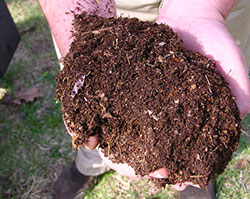All gardens benefit from the yearly addition of organic matter, such as compost. On sandy soils, organic matter improves the soil’s ability to hold water and nutrients. On clayish soils, organic matter helps “break up the clay,” which reduces soil stickiness and improves water movement.
As a rule of thumb, you should spread and cultivate one to two inches of compost into vegetable and flower gardens yearly. Yearly, not one-time, applications of compost make soil highly productive and easy to manage. Seven bushels of compost will cover 100 square feet, one inch deep.
Compost can also be used as a mulch. A layer of mulch spread over the soil surface helps control weed-seed germination, conserve water, moderate soil temperature extremes, and reduce compaction caused by heavy rains and sprinkler irrigation.
You also can use aged compost as a peat-moss substitute in potting soils and seed-starting mixes. Aged compost can comprise up to one-third of the mix.
The primary benefit of compost is soil improvement, not nutrients. Compost adds small amounts of nutrients and substantial organic matter to the soil. If you don’t add nitrogen fertilizer to low-fertility soils, the soil may suffer from nitrogen deficiency.
Compost is a valuable resource, because it helps maintain soil quality for optimum garden productivity. And home composting is an efficient way to recycle yard wastes.
For more information, see the following Planttalk Colorado™ video(s).
For more information, see the following Colorado State University Extension fact sheet(s).
- Choosing a Soil Amendment
- Composting Yard Waste
- Organic Fertilizers
- Perennial gardening
- Vegetable garden: Soil Management and Fertilization
- Preventing E. coli From Garden to Plate



